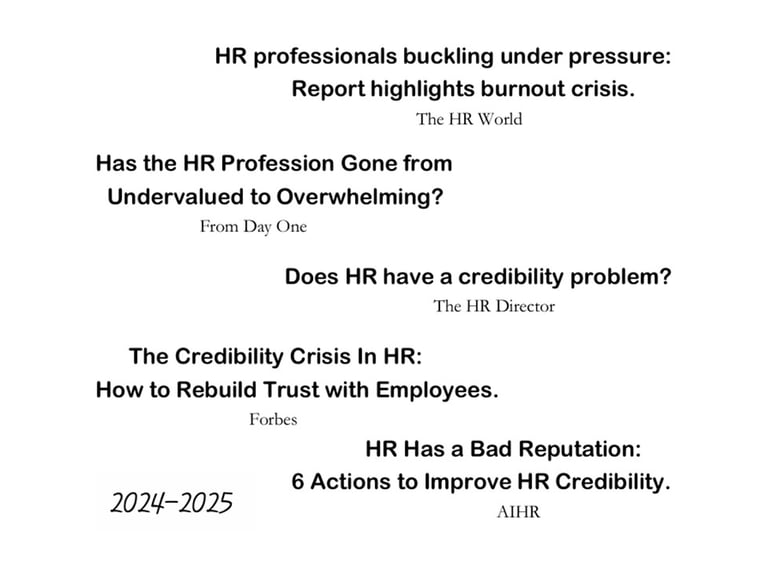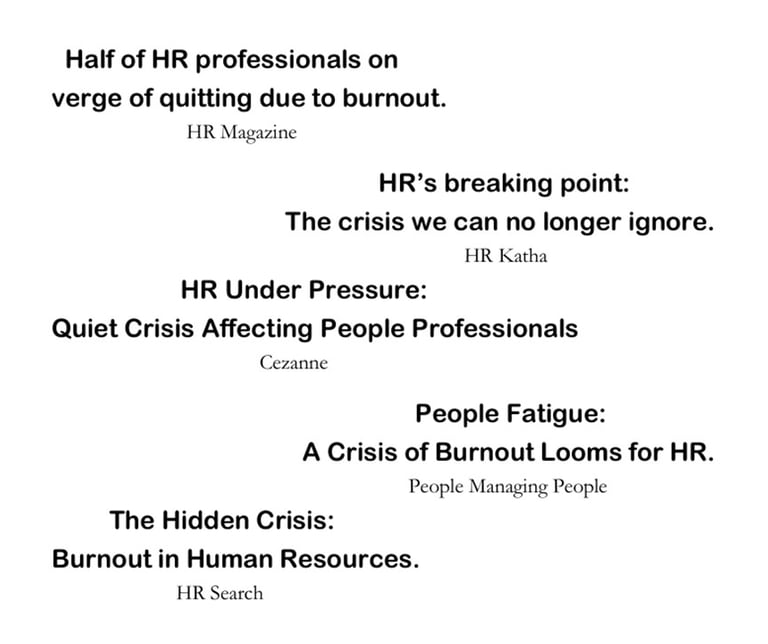The HR Conundrum: Indispensable and insecure
9/29/20253 min read
CIPD Pulse Survey, June 2025, Analysis: Recognition of the HR function in organisations.
Millicent Machell (2024) Half of HR professionals on verge of quitting due to burnout. HR Magazine, Mark Allen Group, London.
Prijja Saha (2025) HR’s breaking point: The crisis we can no longer ignore. HR Katha.
January 2025 HR Under Pressure: The Quiet Crisis Affecting People Professionals. Cezanne, London UK (with HR Ninjas).
David Rice (2025) People Fatigue: A Crisis of Burnout Looms for HR. People Managing People, Black White Zebra, Vancouver BC, Canada
Kerri Masterson (2024) The Hidden Crisis: Burnout in Human Resources. HR Search, Ireland.
Paul Bauer (2025) HR professionals buckling under pressure: report highlights burnout crisis.
The HR World, Bristol, UK.
AIHR (2025) State of HR.
Emily McCrary Ruiz Esparza (April 2023) Has the HR Profession Gone from Undervalued to Overwhelming? From Day One, Day One Media Inc. Brooklyn, NY.


The HR Conundrum: Indispensable and insecure
Here’s the oddity. Under HR anxiety sits durability. HR reports threat, burnout, and existential doubt—yet it persists and expands. In practice, HR is the front door for messy organizational problems. New strategy? HR, tell the story. Culture wobble? HR, fix the vibe. Performance dip? HR, change the people. The work is real. So are the side effects: interventions that solve one problem and quietly create two more, plus some scar tissue. Over time the function becomes a sponge for organizational contradictions—accountable without authority, empathetic without insulation, strategic without power. No wonder there’s fatigue.
The UK’s CIPD 2025 pulse survey of over 1,000 professionals shows mixed signals. On the one hand, respondents identify clear priorities: supporting line managers with people management (43%), fostering collaboration across the organization (37%), and developing organization development and change management skills (26%). On the other hand, that means that 57–74% disagree or apportion considerably less importance about these areas.
Perceptions of HR’s impact on business are nuanced: 62% view HR as favorably contributing to business outcomes, leaving 38% with a less positive view (note: this is HR’s perceptions of non-HR perceptions!). Sixty-six percent believe HR is understood to work collaboratively toward business goals, leaving 34% who do not. Only 49% of HR respondents feel they have clear measures of success, meaning 51% do not! Forty-five percent think HR’s reputation has improved over the last five years, therefore 55% see no improvement. 56% report the scope of HR activities has broadened, and 58% feel their employer supports the unique pressures of HR, which means a big 42% do not.
Even with reported progress, these figures are concerning. Literature and media also regularly flag burnout as a persistent trend. In other surveys, the patterns are striking. More than half of professionals are contemplating leaving the field in some surveys. A large Asia-wide study reports that 93% feel emotionally, physically, and mentally exhausted; 83% have taken time off in the year; and 58% have considered quitting the profession. This is all in 2024-25.
What explains these cited causes? Largely, emotional labor, limited resources, structural constraints, role ambiguity, competing priorities between employer and employee, and heavy workloads. They are often framed as exogenous pressures imposed onto HR. Yet other surveys point to endogenous, or “in-house,” deficits: a shortage of quantitative and analytical capability, weaker business and quantitative skills, insufficient career development, and a need for new pipelines into HR. Could these internal factors be shaping tensions too? It has been suggested the profession oscillates between being undervalued and overwhelmed. Neither state is healthy.
SOURCES




